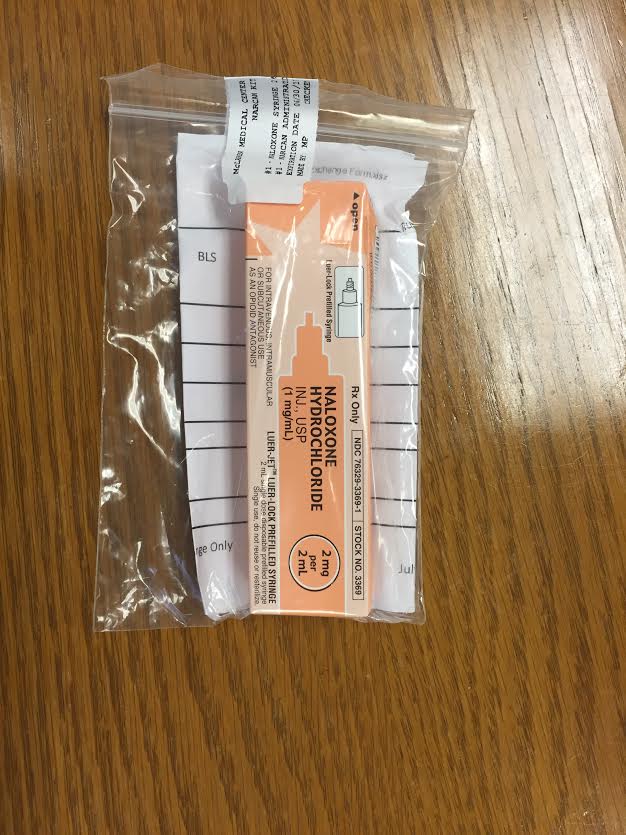'Narcan' Use Increasing in Communities
- Published: 12/16/2015
- Comments
MERIDIAN TOWNSHIP - When Phil Pavona discovered that his son, Eric, was addicted to heroin, Phil and his family had to go through two and a half years worth of in-patient and outpatient rehab, 12-step meetings and even some visits to jail.
In high school, Eric scored a 32 on his ACT scores, finished a few years of college and had the world at the tail, as his father described him...before he got involved with drugs.
When people would call to offer their condolences to the family, Phil says, people began to ask questions about what happened to his son.
In spite of trying to keep his son's reputation clean, Phil began to realize that he wasn't alone.
"So these people would call with offers of condolences, and within a couple of minutes, they would begin to cry on the phone, and say 'Our son is a heroin addict... my daughter is a heroin addict, my niece, my nephew, my brother, my sister," Pavona said.
Phil also says he feels the healthcare system failed his son.
Since Eric was over 18, Phil and his wife had signed HIPAA release forms, so when his son had overdosed and was taken to the hospital a few days before his death, they were supposed to receive a phone call letting them know Eric was there.
But Pavona says, he never got that call, despite signing all the appropriate paperwork.
"The only reason we knew anything about it was we received a patient satisfaction questionnaire in the mail, a couple of weeks after he died addressed to him from the hospital, and when I opened it up, they were asking him about what he felt of the care he received on a particular date. And I looked at that date and kind of shook my head and said... 'He did not receive care on that date," He explains.
But Eric did receive care on that date because he had overdosed a second time.
Unfortunately, Eric eventually died of a heroin overdose in their home.
Had the Pavona family knew about the overdose that sent Eric to the hospital, Phil says they would have taken the appropriate steps to get Eric clean again.
Phil helped start the Okemos and Ingham County Chapter of Families Against Narcotics (FAN), an organization dedicated to the awareness of prescription opiate drug abuse.
Recently, a drug approved decades ago is starting to become a big help in the combat against drugs.
It's called "Naloxone" or more commonly known as "Narcan," and according to a recent article in Fortune Magzine, Narcan instantly reverses the effects of an opioid overdose and was recently approved to come in the form of a nasal spray.
Some states have allowed the drug to come in an over-the-counter form as well.
Narcan saved Eric Pavona's life twice on two separate occasions and probably would have saved his life the third time he overdosed.
Chief David Hall from the Meridian Township Police Department says he's noticed a spike in heroin use over the past few years and says Narcan's usage is vital.
"I want to say it's a miracle drug and it saves lives," Chief Hall says.
Initially Narcan was allowed to be carried to be paramedics, however a house bill that passed last fall allowed police officers and family members to carry the drug too.
But with the drug now readily available in a nasal spray and in some states allowed at your local pharmacy, many people argue that Narcan will encourage the usage of heroin and will be relied on from addicts as a "backup plan."
"They still need to go to the hospital, because that drug, by my understanding, will only last so long, the positive effects of it will last so long...so they still need to be transported to the hospital, but it gives them a window. It's that next step of treatment to the patient," Chief Hall said.
And Phil Pavona agrees.
"I have never met anyone who viewed Narcan under that circumstance because, again they all think they're not going to overdose, they all think they're doing it safe, they go on the internet, they read what they're supposed to read, but again they have no idea of the potency of the heroin at that time," Pavona said.
And Phil says Narcan alone isn't going to save the life of an addict.
"What's really going to save their life is treatment, a support system a plan, getting hooked into the community, you know. The Narcan is the band-aid that stopped the bleeding... and if anyone thinks that Narcan is the only tool that someones gonna have in their toolbox... they will eventually die."


 Spanish
Spanish Chinese (Simplified)
Chinese (Simplified) Korean
Korean French
French German
German Hindi
Hindi Urdu
Urdu Japenese
Japenese Arabic
Arabic Russian
Russian Farsi
Farsi
